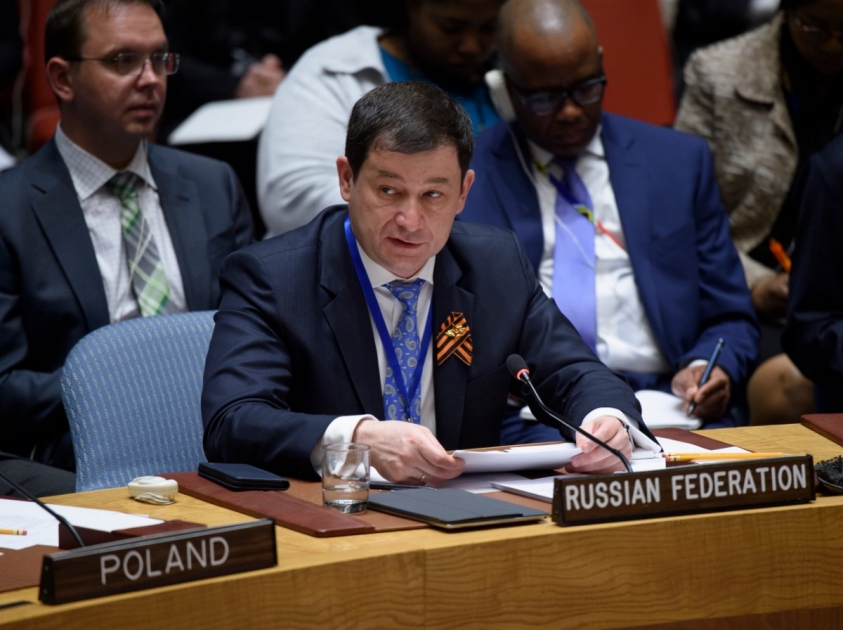Statement by Acting Permanent Representative Dmitry Polyanskiy at the Security Council open debate “United Nations peacekeeping operations. Investing in peace: Improving safety and performance of UN peacekeepers”
Distinguished Mm. President, Mm. Minister.
We welcome you in the Chair of the Security Council. We are thankful for convening this debate on issues related to peacekeepers’ training and to capacity building of UN Peacekeeping operations.
We thank Secretary-General of the United Nations Antonio Guterres and other briefers for their informative briefings.
We share the concern that modern challenges make it imperative to rigorously train peacekeeping contingents. This becomes all the more urgent for the missions with integrated mandates that are deployed in the most complicated and dangerous conditions. High quality training plays a crucial role in staffing of present-day multi-component peacekeeping missions. This actually defines the efficiency of UN peacekeeping activities.
The United Nations cannot solve the issue of training – the major responsibility rests with the Member States.
We know this too well. Russian peacekeepers – men and women – are deployed as part of eight UN peacekeeping operations. My country takes active part in providing air services to the United Nations. Therefore, Russia has accumulated extensive expertise in training of peacekeepers.
Russian facilities train both Russian and foreign peacekeepers – police and formed units, military observers. There is a training system that includes both general and specific training, the latter to take place before peacekeepers are deployed as part of a concrete mission. Their linguistic training is also adaptive to the specific requirements.
We believe we need close “triangular” cooperation and coordination of efforts when it comes to building capacity between the Security Council, troop-contributing countries and the UN Secretariat. However, direct contacts between States that develop training programs and States that participate in them are no less important.
We hope that the process of institutionalizing the light coordination mechanism and linkage of inter-State interaction to the Secretariat will neither create extra impediments nor provoke undue competition between the contributors of training programs. We hope it will raise awareness of troop-contributing countries about programs they can access.
It is crucial to account for objective reality of today, realize what is in demand, what kind of peacekeepers should be trained and what areas are the most urgent.
Views and concerns of troop-contributors should be taken into consideration. It is their “Blue Helmets” and “Blue Berets” who know better than anyone what tasks are completed when working “on the ground” and what expertise is required to do this.
We would like to mention that efficiency and safety of peacekeepers does not only depend on how successful their training was. The way the Security Council articulates their mandate is equally important. This, I believe, is the most responsible stage, where the goals should be proportionate to the capabilities.
This year we are continuously concerned by an overriding focus on the so called robust mandates. We should not forget that the right to use force also increases security risks for the Blue Helmets and turns them into a target or even into a party to confrontation. This should not be the case. The goal of peacekeeping is to preserve peace, not to create new risks.
This issue was central when Secretary-General’s Initiative on Action for Peacekeeping was under discussion, in particular when Declaration of shared Commitments in the area of peacekeeping was developed.
It is no secret that despite broad support of these initiatives with Member States, there are still many disputes regarding some key aspects. In September 2018 Russia circulated an official Note as a Security Council official document that explained why we could not support linkage of human rights issues to protection of civil population. When it comes to protecting civilians, we speak about the use of force in accordance with Chapter VII of the UN Charter. Naturally, observation of human rights with the use of force is absolutely out of the question.
Besides, we emphasize that UN missions should prioritize interaction with host governments. Finally – we have said this before and we still believe this is right – not only the Security Council, but also the Special Committee on Peacekeeping Operations should have pivotal role in defining modalities of UN peacekeeping.
It seemed to us that UN Member States and the Secretariat had come to a shared understanding that search for consensus in peacekeeping matters should continue.
Instead, we increasingly often encounter attempts to circumvent the Special Committee and “push forward” those issues in the Security Council that the General Assembly fails to agree on. This approach is unacceptable for us.
This being said, we cannot underestimate the importance of the Secretary-General’s initiatives regarding specific peacekeeping issues. In the first place, this applies to the issues related to training and capacity building of peacekeepers. We need to move forward collectively and look for well-balanced solutions.
We are satisfied to see that it is those well-balanced approaches that are reflected in the statement by the President of the Security Council that was adopted today. Let me say frankly, working on that statement was not easy. There were delegations who avoided active engagement until the final round.
We highly commend the efforts of the Indonesian delegation that displayed perfect art of diplomacy, which made it possible to come to a result that is acceptable for everyone.
We believe it is necessary to continue working on development of UN peacekeeping based on consensus while being attentive and respectful to each other. This is the only approach that will let us to the fullest extent achieve the ambitious goals that the Secretary-General articulated in the area of peacekeeping.
Thank you.
